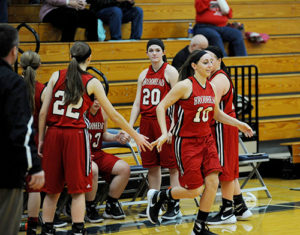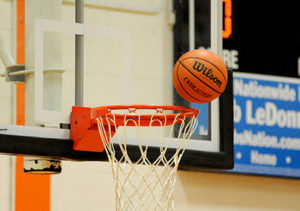Properly developing player leadership
Vince Lombardi once said, “Leaders are made, not born.” In our program, we believe this statement and work hard to put it into action.
 The most important part of a basketball program is the kids. Peer pressure, whether positive or negative, is a great motivator. This is why our team has put a substantial amount of responsibility on our captains. Although we understand some players are born leaders, we do believe leadership skills have to be developed.
The most important part of a basketball program is the kids. Peer pressure, whether positive or negative, is a great motivator. This is why our team has put a substantial amount of responsibility on our captains. Although we understand some players are born leaders, we do believe leadership skills have to be developed.
Selection counts
The first concern of training young people to become leaders is selection. Not just anyone can be a team captain in your program. Some kids have characteristics that set them apart. Look for several elements in your potential leaders. We pick a few captains, and here are some things we look for:- Work ethic. A kid who has had to work for everything has a better understanding of what teammates are going through. This type of player is able to better teach and have the respect of those who have watched the captain achieve. This work ethic should show itself in the classroom and the community. The player must take pride in himself or herself before others can be expected to take pride in the player.
- Ability to communicate. You expect everyone on your team to communicate on the floor. An effective team captain must be able to talk to teammates off the floor as well. The captain must be the liaison between the team and the coach.
- Athletic ability. Sometimes a player can be a great leader because he or she is admired for great athletic ability. This person, however, can only be a great leader if he or she possesses a good work ethic and the ability to communicate.
Since leaders have to be developed, you must teach this to your players. Select team captains in the spring for the following season. Your newly selected captains have until the beginning of the season to prove that they really want to be leaders.
Player responsibilities
These responsibilities help your captains become better leaders.
- Set an example. By far, the most important function your captain must perform is set an example of what it takes to play in your program. You are constantly telling players that some young boy or girl is watching them, and you want children to have a positive role model. Your leader must be an example to teammates of how to handle criticism.
- Talk to future players. Every spring, we meet with middle school players and discuss our camp and summer workouts. I take the captains with me and encourage them to say a few words to the younger players.
 Work summer camps. Having your captains work summer camps is a good opportunity for them to become better teachers and get to know the new players.
Work summer camps. Having your captains work summer camps is a good opportunity for them to become better teachers and get to know the new players.- Organize programs. In our state, a coach is not allowed to have a great deal of offseason contact with players. We have turned this into a positive by making our captains responsible for organizing our summer league and summer team camp. They’re also in charge of arranging any unofficial practices they feel are necessary to prepare incoming freshmen.
- Lead preparation. Have your captains make sure teammates are ready to practice and ready to play. This may be difficult, since captains deal with so many different personalities. A captain must make sure he or she is ready for practice before preparing the rest of the team. Captains are responsible for calling the team if there is a change in practice times.
- Scrimmage coach. Once a week during the preseason, take about 30 minutes and have an inter-squad scrimmage. Divide the team in half, and let a captain be a player-coach.
- Sweat small stuff. The captains deal with small details of practice and pregame preparation. For example, captains decide whether or not the team wears travel warm-ups to school, what design will be on a T-shirt, or what is worn for pregame warm-ups.
- Get team together. It’s healthy for a team to get together away from the court. Captains should organize sleepovers, pizza parties, or even snowball fights to allow the team to get to know one another.
- Practice the team. There have been a few occasions when the team has not played well, and you might consider making captains run practice or even break down film for an upcoming game. Be careful. You don’t want to do this very often.
- Advertise games. Since our games do not draw the big crowds, we let our captains advertise our game schedules in the school and community.
Understand that all of these items are ultimately the responsibility of the coach. A smart coach closely observes from a distance and makes suggestions and corrections.









